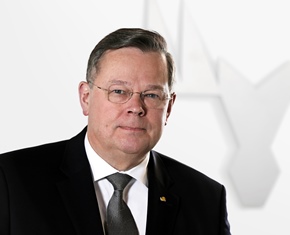 |
||||||||
| February 17, 2016 | ||||||||
| Field Report - Hydraulic hose best practices |  |
|||||||
|
· Subscribe to Ahead of the Curve · Newsletters · Ahead of the Curve archived issues · Contact the Editor
|
Kari Jordan on: Successful Transformation  Metsä Group President and Chief Executive Officer Kari Jordan has recently been named RISI’s European CEO of the Year for 2016. This is the first time Jordan has picked up the prestigious award; he was unanimously chosen by a group of financial analysts and portfolio managers covering the forest products industry. One of the analysts commented, “under Jordan’s leadership the performance and prospects of the Metsä Group have been transformed over recent times.” Metsä Group is headquartered in Finland and has an annual turnover of approximately Euro 5 billion ($5.5 billion). Operating in 30 countries and employing around 9800 people, the company owns 22 pulp, board and tissue mills in five European countries and produces wood products, pulp, and fresh forest fiber paperboard, as well as tissue and cooking papers. Metsä Group is one of the largest producers and users of bioenergy in Finland. The company has a number of exciting projects underway, including the startup of a new board machine at its Husum mill early this year, and one of the biggest projects ever undertaken in Finland: the building of a bioproduct mill in Äänekoski. In this exclusive excerpt from the March/April issue of Paper360°, Senior Editor Mark Rushton asks Jordan about his business strategy. MR: The analysts who nominated you for the CEO of The Year Award commented: “The Metsä Group story is a great one, when you look at where it was four or five years ago, to where it is now.” Can you tell us about that journey over the last few years? KJ: Metsä Group’s transformation has been massive and successful. The first decade of this millennium was challenging due to the massive decline of printing paper demand, which started in North America and spread eventually to Europe. We decided to start heavy restructuring in 2005. This turned out to be a very wise decision. In 2005-2015, printing and writing paper demand has fallen by more than 30% in Europe and the decline continues. We have done a lot of work to focus on our core businesses. Our measures have included, for example, closures of numerous unprofitable paper machines and divestment of graphic paper and paper merchanting businesses. The last small scale printing paper volumes will be produced this year. In addition to paper production, significant restructuring and efficiency measures have been implemented in other Metsä Group’s businesses. At the beginning of the restructuring in 2005, the profitability of Metsä Group was poor. Annual sales were Euro 8 billion ($8.72 billion) and there were about 30,000 people employed. Today we employ fewer than 10,000 people and our annual sales have reduced to slightly above Euro 5 billion ($5.5 billion). But most importantly, our profitability has improved significantly to best in class level. And this has been done in a very modest macroeconomic situation. At the same time our balance sheet has improved materially. Today Metsä Group’s main businesses are wood products, pulp, paperboard and tissue and cooking papers. In these businesses we are top players in Europe and even in the world. Our restructuring phase has come to the end and now we are focussed on growing our selected core businesses. The Äänekoski project looks like something of a vision for the pulp, paper and bio related industries. What will it look like in five years time in terms of its outlook and added value products that will emerge from the mill and side stream companies alongside it? The core is the most efficient pulp mill in the world. All the side streams will be used to produce high value added bioproducts—either by ourselves, or in co-operation with partner companies. The amount of traditional bioproducts like tall oil, turpentine and bioenergy will be increased clearly. Production of new bioproducts will start gradually, partially at the same time as the whole mill starts up.
Our development work focuses on production of different gases, fertilizers, sulphuric acid, textile fibers and different biocomposites. Share of biochemicals, bioenergy and other bioproducts other than pulp will be about 20% of the mill’s total sales already at the start up stage. The forest industry is a success story and will continue to be so. Forest products will be a part of the solution for the future—not part of the problem. Current products continue to be the mainstream—further developed, of course. But there will be a wide range of new wood fiber based bioproducts, partly combined with other raw materials. Metsä Group will have a strong role in this future development. Now that you are Ahead of the Curve, stay there by joining TAPPI. |
|||||||
 |
||||||||
